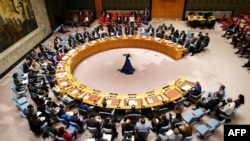Israel demanded Sunday that the U.N. Security Council act to punish and deter Iran following an unprecedented Iranian military strike on Israel that Tehran said was in retaliation for a suspected Israeli strike on its embassy in Syria earlier this month.
“Today, the council must take action,” Israel’s U.N. envoy, Gilad Erdan, told the Security Council. “Condemn Iran for their terror; trigger the snap back mechanism and reimpose crippling sanctions; designate the Iranian Revolutionary Guards Corps as a terror organization. Action must be taken now — not for Israel’s sake, not for the region’s sake, but for the world’s sake.”
Israel requested the emergency meeting following a direct attack on its territory by Iran that it said included 170 armed drones, 120 ballistic missiles, and 30 cruise missiles. Israel said its air defenses, along with those of the United States and other allies, shot down 99% of them.
Erdan criticized the council for not listening to Israel’s warnings over the years about Iran. He said the international community has been silent on the rise of “a Shiite Islamist Reich,” but with Iran’s direct attack on Israel, the regime has now been exposed.
“As Iran’s mask has fallen, the world’s complacency must also fall,” the Israeli envoy said. “The mask comes off and the gloves must come on.”
He said Iran had “crossed every red line” and that Israel reserves the legal right to retaliate.
Iran’s envoy said they had no choice but to exercise their right to self-defense following the April 1 attack on their embassy in Damascus and the Security Council’s failure to formally condemn it.
Some council diplomats said the United States, France and Britain blocked a condemnation because they had questions about whether the Iranian premises were being used for covert operations.
“This lawless regime has committed many atrocious crimes against our people,” Iranian Ambassador Amir Saeid Iravani said about Israel. “This regime blatantly and openly admitted its responsibility for the terrorist and destructive operations committed against Iranian officials, scientists and civilians, and sabotage against our peaceful nuclear infrastructure in recent years.”
Israel has allegedly carried out several strikes, assassinations and cyberattacks on Iran in recent years, most targeted at their nuclear program. Israel never publicly confirms such operations.
Iravani said Iran “does not seek escalation or war in the region” but would defend itself if necessary.
He also emphasized that Iran does not want a conflict with the United States.
“We demonstrated our commitment to peace by exercising our restraint about involving the U.S. Army in intercepting Iranian drones and missiles bound for military targets in the occupied Palestinian territories,” he said. “This underscores our dedication to deescalating tensions and avoiding the expansion of conflict.”
But he added that if the United States military initiates any operations against his country, its citizens or its security interests, Iran would “respond proportionately.”
U.S. envoy Robert Wood said Washington is not seeking an escalation with Tehran but issued a warning.
“And let me be clear — if Iran or its proxies take actions against the United States or further action against Israel, Iran will be held responsible,” he said.
Wood said the United States would begin consulting with other countries to “explore additional measures to hold Iran accountable here at the United Nations.” He did not go into details on what that might include. He also urged the Security Council to “unequivocally condemn” Iran’s actions and call for its partners and proxies to cease their attacks.
Iranian-backed groups, including Hezbollah in Lebanon and the Houthis in Yemen, have fired rockets and missiles at Israel, and the Houthis have carried out attacks on ships in the Red Sea and the Strait of Hormuz.
The U.N. secretary-general addressed the emergency meeting, appealing for a de-escalation and a lessening of tensions.
“It is time to step back from the brink,” Antonio Guterres said, adding that neither the Middle East nor the world could afford more war.
Most Security Council members condemned the escalation and echoed the U.N. chief’s calls for de-escalation and diplomacy, while expressing concern about the risk of widening regional turmoil.




